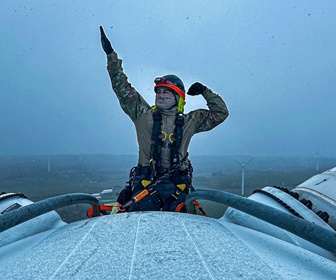The Netherlands Enterprise Agency (RVO) published the results of “Site VII” of the Hollandse Kust West (HKW) tender. It is the latest big auction using non-price criteria. Oranje Wind Power II, a subsidiary of RWE, won the auction.
They will build a 700 MW offshore wind farm. Their project also includes 600 MW of onshore electrolysers for the production of renewable hydrogen, 225 MW of e-boilers for district heating and industrial application, batteries and floating solar energy.
This auction proves using qualitative criteria works, WindEurope CEO Giles Dickson said. Governments can evaluate bids on objective and measurable criteria. The auction for “Site VII” of HKW focused on how well the wind farm will be integrated into the Dutch energy system. In total 90% of the scoring was related to qualitative criteria. Next month the Dutch will present the results for “Site VI” of HKW also based on 90% non-price criteria, this time focused on biodiversity.
The use of these criteria recognises the wider societal value that wind energy brings, e.g. in protecting biodiversity and ensuring the smooth operation of the wider energy system. They will reward investments that the wind industry has made in these areas including in the development of relevant technology.
The European Commission’s State Aid Guidelines for Energy allow for up to 30% of the scoring in Contract for Difference (CfD) auctions to be based on non-price criteria. The Dutch are not using CfDs so they can have an even higher rate. Beyond the Netherlands, France are using non-price criteria for 25% of the scoring in their latest offshore wind auction – for a 1 GW wind farm off Normandy. The German Government will use 4 non-price criteria for offshore wind farms which will not receive Government support. And Belgium is consulting on an extensive set of criteria.
It is important that non-price criteria are clear, comparable, easy to measure and that they complement existing policies. They must avoid creating significant additional administrative or management costs for market players. And build on the wind industry’s strengths and incentivise further innovation.
The financial part of the bid only made up 10% of the overall score. The Dutch Government will not provide any financial support for the project. Instead, this score was based on the readiness of bidders to pay the authorities up to €50m.
This auction was a success, but the auction design can still be improved. Developers put a lot of resources into their bid to ensure their projects score well on all non-price criteria. Those who did not win in spite of strong bids will not get to build any project, at a time when Europe urgently needs for generation capacity to address the energy crisis. This could be solved by auctioning more capacity at the same time. The Dutch can already do this in their IJmuiden Ver auction which will take place next year. It would be best if this covered several GW.










